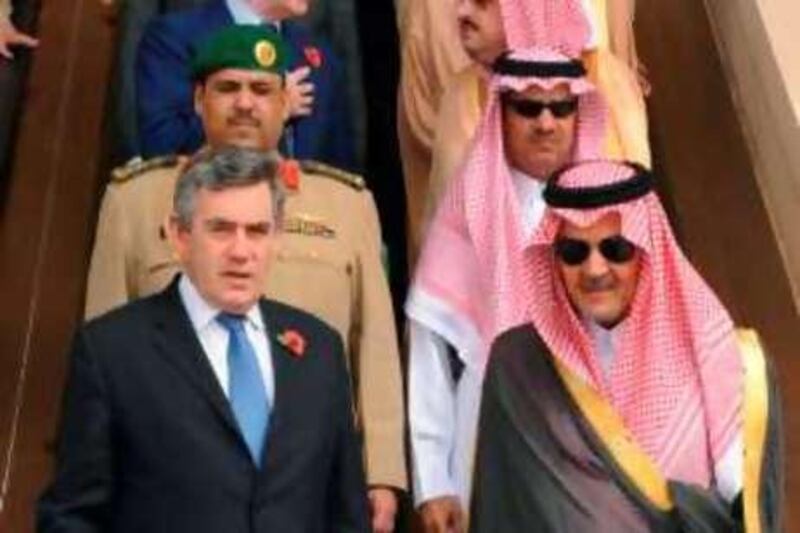Gordon Brown, the British prime minister, arrives in Abu Dhabi today on the third day of a Gulf tour aimed at raising loan capital for the International Monetary Fund (IMF) to help refloat crisis-stricken economies. The global financial crisis has wiped US$700 billion (Dh2.57 trillion) from bank assets, knocked trillions of dollars off stock markets, frozen lending, cut profits and sapped strength from world economic growth.
Gulf oil producers, by contrast, have built up - prior to the global financial crisis - foreign reserves of about $1.5 trillion on higher-than-expected revenues from oil exports, according to the Peterson Institute for International Economics, a Washington-based think tank. "I very much hope you and other Gulf states will be willing to contribute, with other countries, to join efforts to stop the financial crisis spreading by helping to boost the IMF fund for distressed economies," Mr Brown said yesterday.
The IMF has a $250 billion bailout facility, but has stretched itself thin with loans to Hungary, Ukraine and Iceland. Several other countries are expected to request billions more as the crisis deepens. Mr Brown comes to the Emirates after brief stops in Riyadh and Doha, but one of his ministers played down expectations of any immediate agreement on the IMF issue. Peter Mandelson, the former EU trade commissioner who recently returned to London as business minister, said Mr Brown's talks with Gulf leaders were a "process not an event".
"That's why the prime minister spending hours talking one-on-one with the king of Saudi Arabia is so important," said Mr Mandelson, who is accompanying the British leader. "They're getting each other on to the same page of analysis and agreed response and Saudi Arabia's active participation in getting the world through this first financial crisis of the global age." Mr Brown has said he wants world leaders to reform multilateral policymaking institutions to give more power to emerging economies such as China, India and the Gulf states.
At a breakfast for Saudi and British business leaders, Mr Brown suggested that the Gulf states be given a bigger role in international bodies such as the IMF. He said he supported "reforming the international institutions... to give countries like your own a bigger place in the order". Saudi Arabia in particular has "a crucial role to play" at the G20 international summit in Washington on November 15, where its voice "must be heard," Mr Brown added.
Some analysts believe the global credit crisis could bring about a shift in power towards fast-expanding economies such as the Gulf as developed nations repair their banking systems and try to stave off deep recessions. Mr Brown said co-operation between the developed and developing world could create "in its wake a new global order - fairer, more stable and offering greater prosperity for all". Much attention lately has been directed towards the Gulf's sovereign wealth funds, which have taken large stakes in western companies during the past year.
Over the weekend, several Gulf investors, including Sheikh Mansour bin Zayed,the Minister of Presidential Affairs, announced plans to invest up to £7.3 billion (Dh26.81bn) in Barclays Bank, which has suffered a string of losses as a result of the financial crisis. "As long as they play by our rules and operate in a commercial manner, we welcome investment from sovereign wealth funds in the UK," Mr Brown said.
As well as meeting political leaders, Mr Brown is expected to address an oil industry conference in Abu Dhabi today where he will touch on relations between oil producers and consumers, oil prices, the UAE's atomic energy proggramme and renewable energy. Last month, Mr Brown criticised the Organisation of Petroleum Exporting Countries (Opec) for cutting oil production after prices fell by more than half in three months. Declining oil output from the North Sea has converted Britain from an oil exporter to an importer.
"I think people want to invest both in helping the world get through this very difficult period of time but also I think people want to work with us so we are less dependent on oil and have more stability in oil prices," Mr Brown said yesterday. tpantin@thenational.ae with agencies





